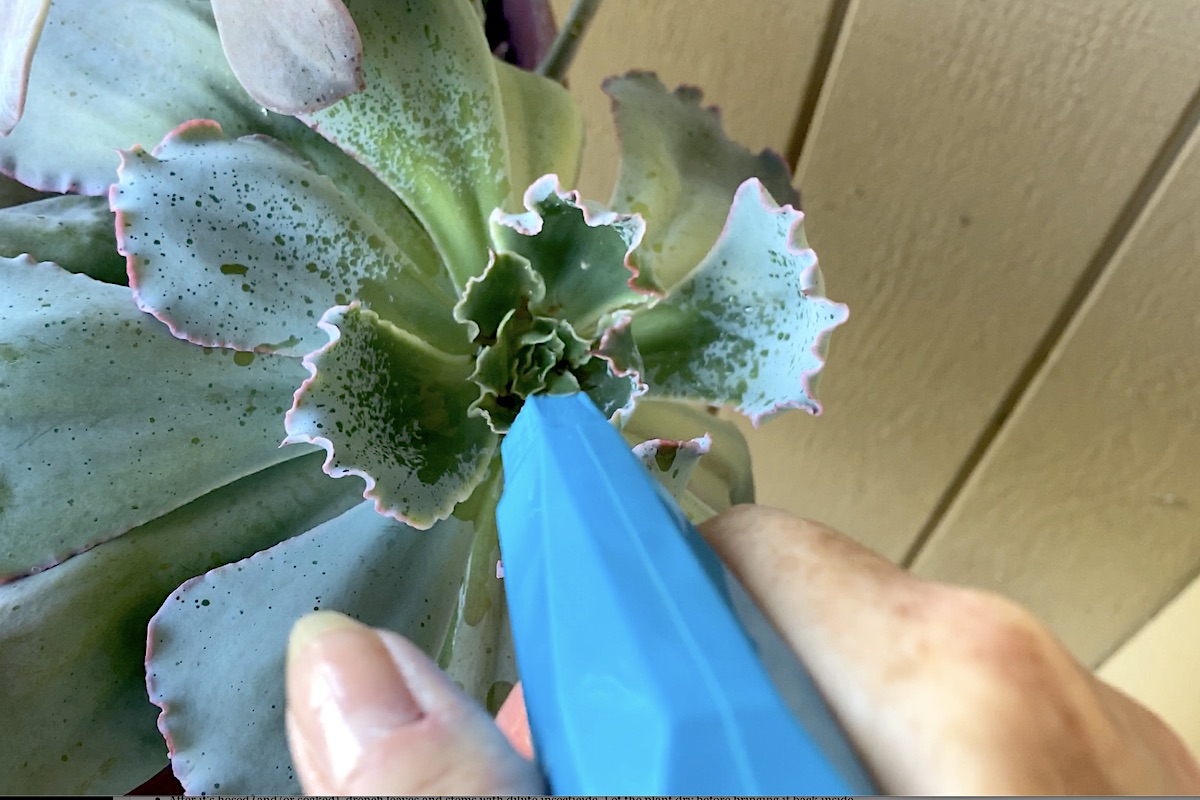
How to Deal with Mealy Bugs on Succulents
If you grow succulents, sooner or later you'll deal with mealy bugs. For newbies, they may come as a surprise. Suddenly the plants are dotted and webbed with what looks like lint. Veterans are more vigilant. We check for mealies routinely and halt the spread early, before it's severe.
Take preventive measures
When potting echeverias and other soft-leaved succulents, add insecticidal granules to the soil per label instructions.
How to deal with early and advanced infestations
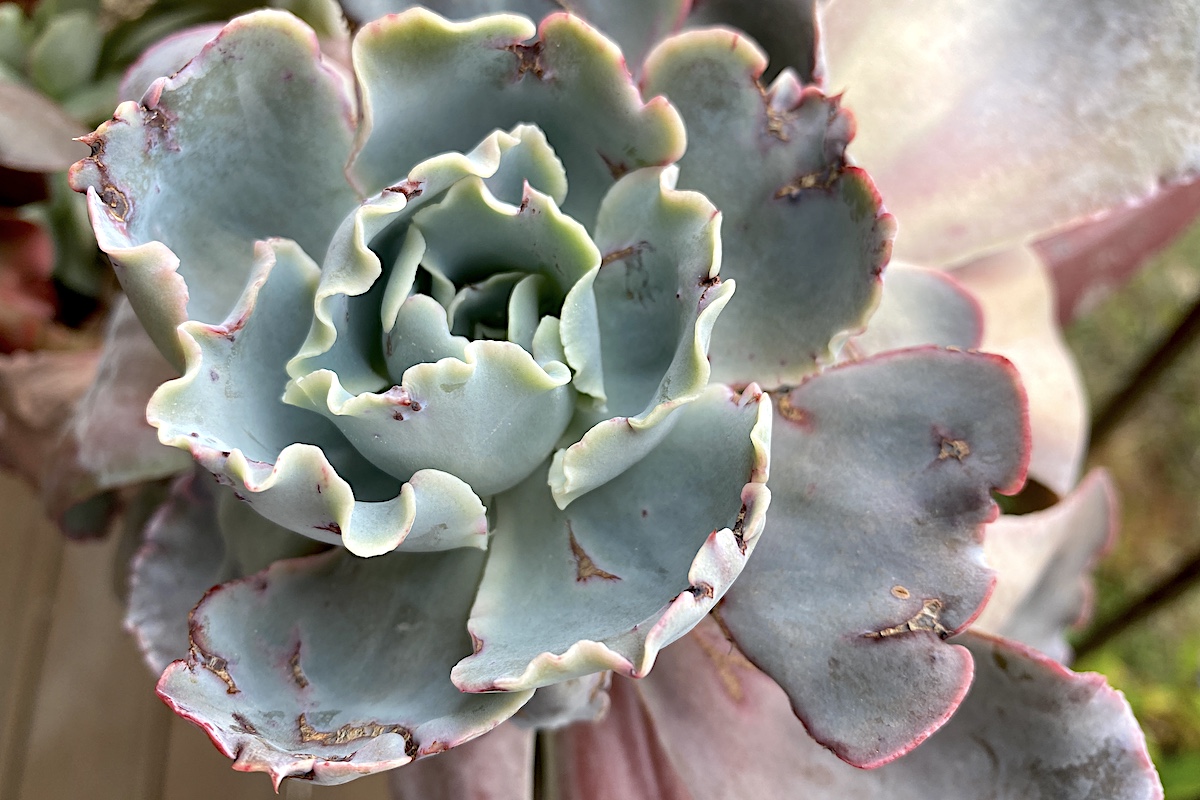
An echeveria's scarred leaves date to a mealy infestation six months prior.
Inspection and Treatment
Check for mealies in the centers of rosette succulents, in crevices, and in leaf axils (where leaves join stems). Unlike aphids and thrips, mealy bugs usually don't colonize flower buds. In my garden, mealies tend to be more prevalent in summer and fall. Ants transport and "farm" the pests for their sweet secretions.
Treat by spraying with 70% Isopropyl alcohol (use 70%; 90% is too harsh). I buy a 32-oz bottle at a supermarket or drug store and add a spray attachment from an empty bottle of, say, Windex. (Btw, some growers use Windex to control mealies and other pests.) If you're treating a delicate succulent, play it safe and dilute the alcohol half-strength with water.
Drenching the bugs with alcohol kills them on contact and their eggs as well. Although it may temporarily dissolve the leaves' powdery coating, I've yet to see alcohol have a lasting impact on the plant.
Isolate affected plants to keep pests from spreading.
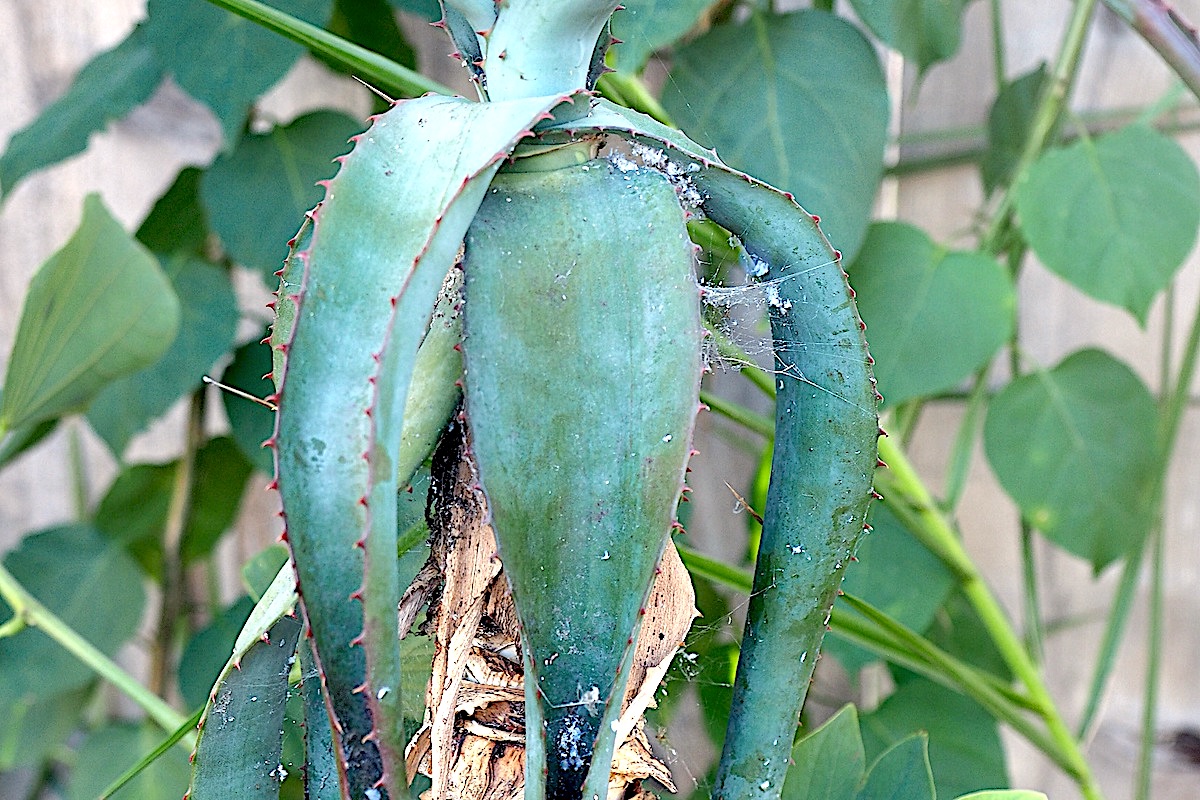
Severe mealy bug infestation on an aloe
When an Infestation is Severe
From my site's Pest Forum: An exchange with Kristi, a newsletter subscriber in Denver. She writes:
Q: Help! I'm at my wits end with an infestation of mealy bugs on my beloved Jade plant. I’ve sprayed with 70% Isopropyl alcohol repeatedly and still have a problem. Not too mention hard to spray in the shower with the smell! There is damage/scarring where the leaves meet the stem and in the middle of some of the leaves. The plant is very big and dense so its difficult to spray into the middle and hit all the leaves and underneath. The plant is very heavy but we do have some warmer weather this week that I can take it outside to spray the plant with alcohol heavily. Short of cutting off every leaf, is there anything else I can try? Is there a safe systemic insecticide to try?
A: Once a mealy bug infestation gets that bad, conventional wisdom is to get rid of the plant. But this one is important to you, so here are some things to try:
- Take it outside on a warm day (above 40 degrees) and hose it down. It’s OK if some leaves fall off. If they’re that loose, they probably will anyway.
- Repot it. Mealies can get in the soil.
- If that’s not possible, fill a bucket with water and add systemic insecticide “for sucking insects” per label directions. Wear gloves. Brands available on Amazon include BioAdvanced and Monterey Systemic Soil Drench.* (Both are used for food crops, so they're relatively "safe.") Let the pot sit in the bucket until the soil is soaked—an hour or so.
- After the plant is hosed and/or soaked, drench its leaves and stems with dilute insecticide. Let dry before bringing it back inside.
Prevent a Recurrence
- Do NOT put the plant back where it was. Regardless, DO clean the area thoroughly, because mealies can hide in, and lay eggs in, the tiniest crevices.
- Indoor plants can be breeding grounds. Get rid of or isolate any that have the problem. Treat with alcohol. If plants are severely infested but worth saving, follow steps above.
- Good air circulation is key to keeping mealies and other pests from settling in. To help it recover over the winter, you might put your jade under full-spectrum lights and use a fan (both on a 12-hour timer).
- Consider thinning it out so air circulates through the plant. Jade cuttings are as good as having new plants, they’re that easy to start.
- Keep me posted on the patient’s progress!
*Affiliate links.
Biological Insecticide
UPDATE from Rick Brown, a horticulturist and nurseryman with Florida Friendly Plants: "Drench the plant with Nofly, a fungus that will control mealy bug, mites, thrips, etc."
From the Nofly website: "Spores attach to a pest's body, disrupts its internal organs, and initiates tissue necrosis. This leads to lack of feeding, inactivity and eventual death."
Related info on this site
Succulent Pests and Problems Q&A Forum
Are pests or mysterious maladies causing problems with your succulents? This page is a forum for you to ask questions, leave comments and share what works for you. Others can see and benefit from the answers. Your own tried-and-true solutions are welcome, too!
Uh-oh, Is My Succulent Sick? Common pests, diseases and problems, plus solutions
Succulent Pests, Diseases and Problems Keep your succulents healthy, happy and looking their very best WEEVIL ALERT: The agave snout-nosed weevil is a major pest in ever-increasing numbers. Don’t wait for signs of infestation; take preventative measures NOW to protect your agaves, furcraeas, yuccas, beaucarneas and mangaves. Please don’t let your yard become a breeding ground for pests that move…

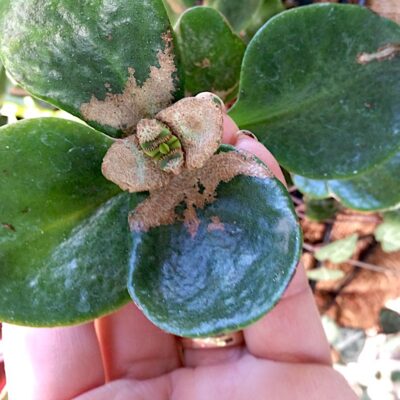
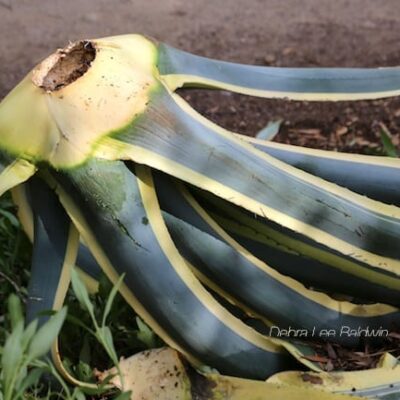
Hi Deborah,
Thank you for reading my comment/question. I live in the US Zone 5a (NW Illinois). During winter, I move all of my plants into my basement. I have approximately 250 plants in 2 rooms. I have a shelving/light system that works pretty well.
Recently, I had a small mealybug issue. No plants lost, but leaves damaged. Now that is under control but now white powder mold is appearing on different echeveria. The most affected are my bigger ruffles—E Crimson tide, E sea dragon, E First Lady, Neon Breakers.
I have added fans and I think that has helped. However, for the plants that have it do not need to get rid of it. I have gone to my local nursery and he doesn’t know what to recommend. I don’t really see this issue on different sites.
Any help would be great appreciated.
Thank you in advance.
Allison Stingley
Hi Allison — Indoor overwintering generally means no air circulation, so the fans are a good idea. But if you already have a mildew problem (and this sounds like powdery mildew) the fans may help it spread (eek!) Isolate the affected plants and spray with a horticultural fungicide. Here’s one that’s biodegradable and nontoxic. P.S. Thanks for mentioning where you’re located—it’s always helpful to know.
Thank you so much!
I’m very glad I could help, and that your plants have turned the corner!
HI Allison,
I’m not sure what to tell you. I saw one posted that question a white power on the soil. They were told it was a mold and not to be too concerned.
Does the white power clean up?
Hi!
You can rub the white powder off, but you can see residual damage underneath. My plants have turned the corner so that is a positive! However, I lost a boatload of plants and leaves. Debra Baldwin is correct-it’s powder mildew, which doesn’t wipe off.
Thank you for responding!
Hi Debra. . . .
I’ve recently purchased 90% alcohol (it has been hard to find in 2020 in any concentration!). Any idea how much to dilute the 90% so it’s safe to treat the mealies on rosary vines?
Thanks for suggestions to use diluted systemic insecticide. It’s good to have a back-up plan when alcohol isn’t cutting it!
Love LOVE all the help you offer!
Hi Marilyn — Thank you! I’m no chemist, but it seems to me if you dilute 90% Isopropyl alcohol 20% with water you’d get a 70% solution. Btw, I’ve only heard that 90% is too strong (according to the Ruth Bancroft Garden). I’ve never used it. I imagine that such a high percentage would be OK on tough-leaved succulents (like most agaves), and even 70% might be too harsh for really delicate ones (like certain stonecrops). Since rosary vines are on the delicate side, I’d err on the side of caution and mix what you have half-and-half with water—at least for starters. That should safely kill the mealies without hurting the plant.
I envy you, even being able to grow rosary vines! They flourished when I lived at the beach, but here inland, they’re not happy.
Thanks, Debra. Maintaining these rosary vines is a challenge. I seem to be able to knock down the mealies and control them with moderate damage to the plants, but I just can’t eradicate them! And BOY! the vines get so tangled with our recent winds!
Hi Debra,
Exactly what is a rosemary vine? I am curious to know as I live part time on Windansea beach in La Jolla. I grow lots of Tillansdias on the wall, bromelaids, various succulents, begonia on my tiny deck and would love to check out the rosemary vine to see if I can grow it here as you understand the challenging conditions of salt and wind.
Thanks so much for all of your incredible information. I have all your books and have a beautiful garden full of succulent lovelies in Austin, Texas.
xoElizabeth G
Hi Elizabeth–It’s rosary vine, Cereopegia woodii. See it on this page of my site: https://debraleebaldwin.com/containers/make-succulent-doorstep-baskets/. Scroll down to the photo of the echeverias in the repurposed metal berry bowl (looks like a colander). Rosary vine is a dainty trailing succulent with heart-shaped leaves. It comes in and out of stock at succulent nurseries. I’m not finding it for sale at present at my preferred sources, but that might change come spring.
OMG. I see why Marilyn is so into these vines they are amazing. Finding trellis plants for a planter that you like really is up to your local nurseries unless you order online. I live in East Bay and it seems our summers are getting hotter each year. I want to try and find some of these. I typically go to Alden Lane here in Pleasanton or Western Garden. I’ve taken classes at the Ruth Bancroft garden great folks there. Where can I buy these and are they more shade like succulent or partial sun? When I get the mealy bug I just spray 100 alcohol and use a q-tip to remove them but if a plant is infested it’s more challenging. I feel so bad for the plant I go for the top dose but now I’m seeing certain plants might not surviving. And the ants last year were crazy bad with the heat wave so each year is a new challenge. Thanks so much Debra and Marilyn for sharing your wonderful tips. Thanks so much
Kim in Pleasanton 🙂
Looks like rosary vine (Ceropegia woodii) is so much in demand that nurseries can’t keep it in stock, and it sells out fast. I imagine supply will catch up with demand eventually, but such things take time in the plant world!
Hi Debra,
I just got a pot of three different succulents a week ago and one of them (graptopelalum) has the leaves shriveling authorities wrinkles and a sticky substance on it and when I touch the leaf, it falls off in my fingers. Is this mealybugs?
It could be, but there are other pests that leave a sticky residue—like aphids and thrips. Time to get out the magnifying glass!
“(Btw, some growers use Windex to control mealies and other pests.)”
My husband buys *vinegar* -instead of alcohol- based Windex.
I doubt that it will have the desired effect on unwanted critters.
Do you agree?
Hi Debra, Wondering if you have a new recommendation for a systemic for mealies since we can no longer get/use Imidacloprid (Bonide systemic) in CA? Thank you!
“When potting echeverias and other susceptible succulents, add insectical granules to the soil.”
Hi Emily — I’m not finding a systemic for mealies that is still sold in CA, only sprays that control the pests once there’s an infestation. So you might as well save money and spray with Isopropyl alcohol at the first telltale sign of white fuzz in the center of the plants.
Ok, thank you for responding!